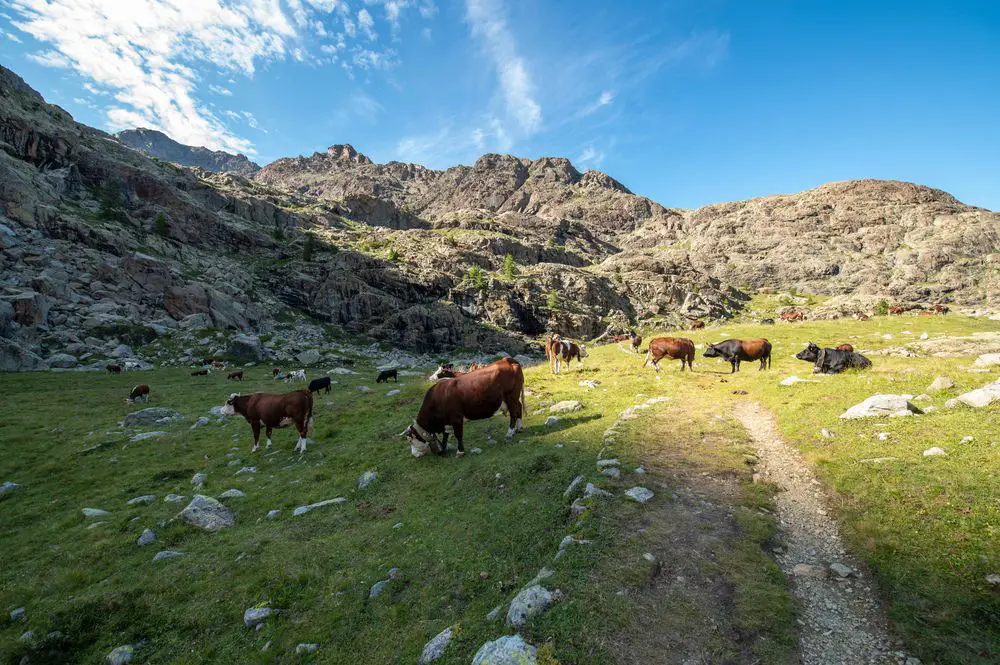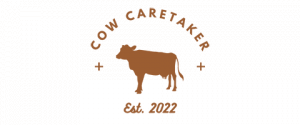Cows are one of the many species of animals eat rocks for a variety of reasons. Gastroliths, the stones that end up in an animal’s digestive system, are commonly associated with helping the animal break down their food.
Cows actually eat rocks for a completely different reason and this article will discuss why they develop this habit.
Table of Contents
Cows Do Eat Rocks
Cows are known to develop a condition known as pica when they have mineral deficiencies or don’t have enough structural fiber in their diet, and may eat rocks for this reason. Pica is when an animal develops abnormal eating patterns where they consume materials that don’t provide nutrition, such as wood, plastic, small stones and other inorganic materials.
This condition is predominantly seen in sick, malnourished, or pregnant cows. The exact cause of pica isn’t clear, though it could potentially be caused by intestinal parasites, heat stress, and general nutritional imbalances.
Cows that are deficient in phosphorous will have both severe medical and behavioral issues, one of which could be pica. Phosphorous deficiency normally causes a cow to have a lack of appetite, which could lead them to start to eat rocks out of desperation to find a suitable meal.
Calcium deficiencies normally lead to a condition known as milk fever, which can cause dairy cows to have a severe drop in milk production. Milk fever is sometimes associated with rock eating due to a cow’s behavioral changes and is very similar to a phosphorous deficiency.
Unlike the many species that benefit from having rocks in their stomach, cows can actually grow pretty sick from having rocks in their digestive tract. Most rocks are incredibly difficult for stomach acid to break down, so they can cause blockages in a cow’s intestines and rumen.
The ingestion of a single rock can disrupt the ability for the rumen to properly break down stemmy and fibrous plant materials such as silage, straw and hay. A cow’s four-chamber stomach is what allows it to break down the cellulose of the grasses it consumes. So if one chamber is blocked with rocks, it can disrupt their ability to get the nutrients they need from their feed.
The Importance of Salt in a Cow’s Diet
One leading suspicion as to why cows start to eat rocks is if a cow isn’t getting enough sodium in their ruminant diet. Salt is a surprisingly important part of a cow’s diet, with most cows needing to consume approximately 0.5 ounces of sodium per day.

Many farmers like to supplement a cow’s sodium intake by offering their herd a salt lick, or salt block for the cows to slowly consume throughout the day. If a cow doesn’t consume enough sodium during the day, they can experience severe muscle atrophy, issues with their nervous system, weight loss, and general stress.
Cows might begin eating rocks if they aren’t consuming enough sodium, possibly due to associating the mineral with the hard, rock-like shape of a salt lick.
Types of Rocks That Cows Eat
There isn’t any rock in particular that cows normally prefer. Whatever rocks are naturally in the pasture or fields where the cows graze are usually the main targets. It’s important to consistently monitor the areas where your cows are grazing and remove sharp rocks that they might decide to eat.
Some sedimentary rocks, such as sandstone, can naturally break down in a cow’s stomach. Igneous rocks on the other hand are rather tough and will be resilient to stomach acid.
Myths Around Cows Eating Rocks
The most predominant myth is that cows eat rocks in order to help them with digestion. While there are many species of animals that do eat rocks in order to digest their food, this simply isn’t how a cow’s digestive system works.
Stomach stones won’t help to break down a cow’s particular herbivore diet, but they will directly harm their small intestine and rumen health. Rocks will only ever cause blockages within the digestive system, leaving a cow in pain and at risk of serious health conditions.
If you notice any behavioral changes in your cow, or even directly see small rocks in their feces that were able to make it through their digestive system, call in an animal health professional. They can assist in healing their digestive system issues.
What Other Animals Eat Rocks For Digestion?
The consumption of rocks can be a vital part of an animal’s diet. There are a wide variety of species who need gastroliths, otherwise known as gizzard stones, to survive.
Crocodiles, chickens, penguins, ostriches, toothed whales, turkeys and earthworms are some of the species that best exhibit the need of gastroliths for digestion. Paleontologists have even discovered gastroliths in dinosaur fossils when examining their ribcage.
